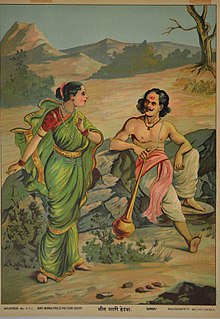Hidimbi
| Hiḍimbaa | |
|---|---|
 Bheema and Hidimbaa, painting by Raja Ravi Varma | |
| Affiliation | Rakshasa, Devi |
| Abode | Kamyaka Forest |
| Texts | Mahabharata |
| Genealogy | |
| Siblings | Hidimba |
| Consort | Bhima |
| Children | Ghatotkacha |
Hiḍimbaa (Sanskrit: हिडिम्बा, IAST: Hiḍimbā), or Hiḍimbi, is the rakshasi wife of the Pandava Bhima and the mother of Ghatotkacha in the Mahābhārata. She meets Bhima in the 9th sub-parva (Hidimva-vadha Parva) of the Adi Parva. She is also referred to as Bhuṭanadevī or Pallavī.
Bhima and Hidimbaa
The story begins in the Lākṣāgṛha of the Mahābhārata after the Pāṇḍavās reached a dense forest. Exhausted from their travels, they all fell asleep at night, except for Bhīma, who kept watch.
In the same forest lived Hiḍimbi and her brother Hiḍimbā, a very powerful rakshasa. He smelled the Pāṇḍavās at a distance and as usual asked Hiḍimbi to lure the well-built Bhīma into a trap so he could eat him. Hiḍimbi confronted Bhīma and instead fell in love with him. She assumed the form of a very beautiful lady and approached Bhīma, expressing her desire to marry him by revealing her true identity, as well as her brother's intentions. Bhīma confronted Hiḍimbā, and soon overpowered the rakshasa and slew him. Kuntī and other Pāṇḍavās all watched the duel from a distance.[citation needed]
Marriage
After killing Hiḍimba, Bhīma married Hiḍimbi. Bhīma decided to live with her till a child was born. Hiḍimbi agreed, and they married. Within a year, Hiḍimbi gave birth to a son. They named him Ghaṭotkacha, as his head resembled a pot. Ghaṭotkacha went on to become a great warrior and an important figure in the Mahābhārata war.[1]
Temples
India
There is a temple in Manali in Himachal Pradesh dedicated to the worship of Hidimbaa. According to the legend, Hidimbaa stayed back in the forest to perform penance and attain the status of a Goddess.[2]
Nepal
Bhutandevi Mandir is a Hindu temple dedicated to Goddess Bhutandevi, located in Hetauda in Bagmati Province. The name of the city — Hetauda itself is believed to be derived from the name of the goddess.[3]
Gallery
- Bhutandevi temple, in Hetuada (Nepal)
See also
References
- ^ "Mahabharata's Bhima was married to a rakshasi – do you know who she is". 5 May 2016.
- ^ "All you need to know about Hidimbaa, the demoness wife of Bhima".
- ^ "नेपालको मौलिक पर्व हो छठ". Tukhabar (in Nepali). Retrieved 14 March 2022.



